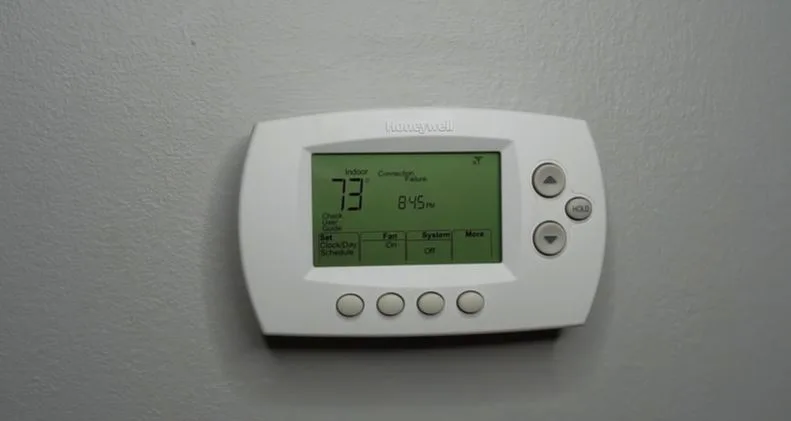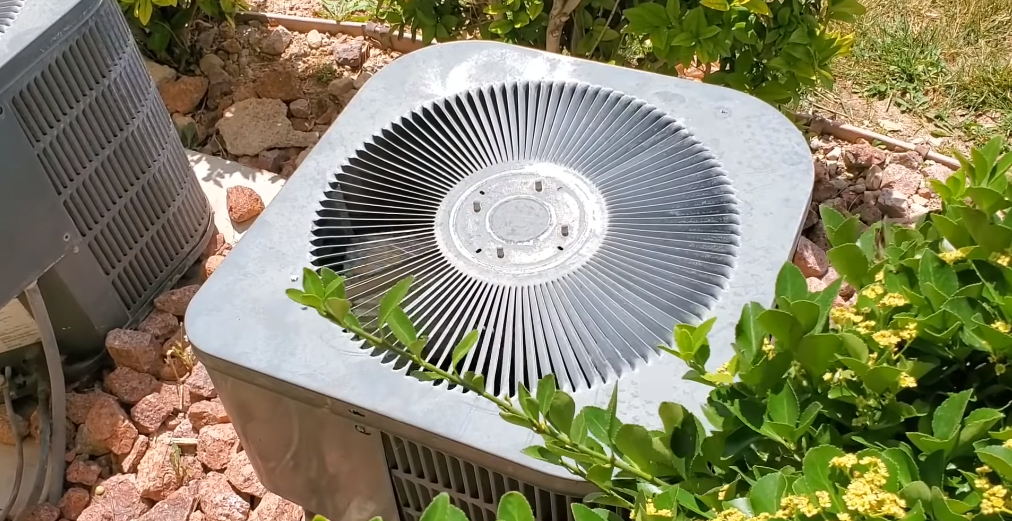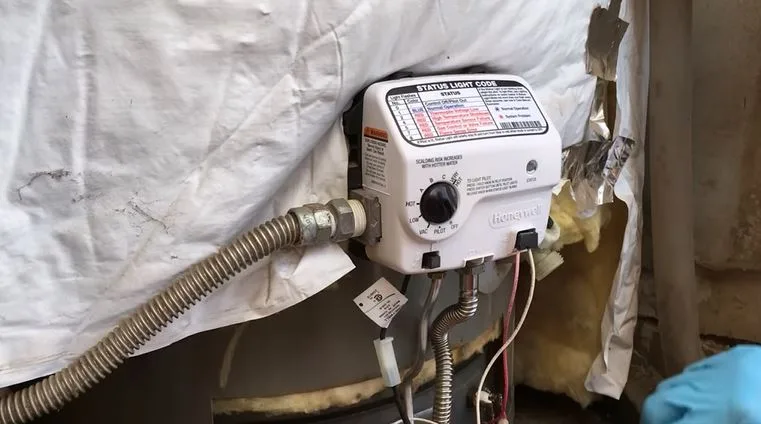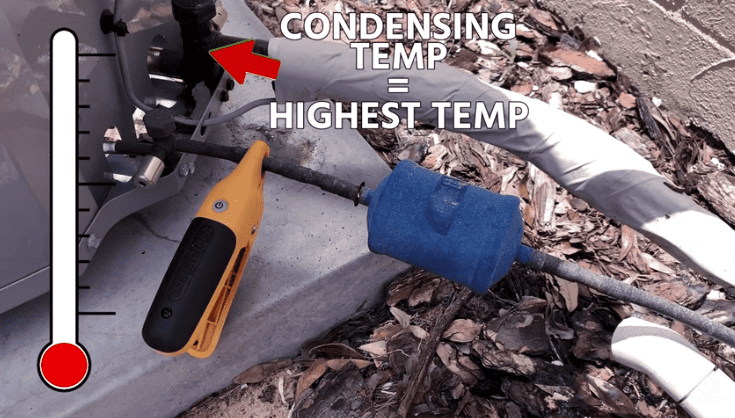Here is Why Your Honeywell Thermostat Won’t Turn Off The AC
Have you been feeling frustrated with your Honeywell thermostat because it won’t turn off your AC? Don’t worry, you’re not alone! It can be a real pain, especially during those hot summer days. But before you start worrying about the cost of repairs or replacement, there are a few simple things you can check.
Read also: Aprilaire Thermostat Says Off [Super Easy Fix]
In this blog post, we’ll go over some common reasons why your Honeywell thermostat might not be turning off your AC and some DIY solutions to fix it. So let’s get started and get your home feeling comfortable again!
Usually when a honeywell thermostat won’t turn off your ac, this could be due to a fan set to on, a stuck relay switch or a bad ac contactor. To fix the problem you might want to check the thermostat fan setting, clean or replace ac relay switches or replace a bad ac contactor.

Possible Reasons a Honeywell thermostat won’t turn off AC
Thermostat settings
When a Honeywell thermostat is set to “on” instead of “auto,” it means that the fan will run continuously, regardless of whether the cooling system is actively cooling or not. This setting can prevent the AC fan from stopping blowing cold air, even when the desired temperature has been reached.
This will make it seem like your ac is not turning off even after you turn off your honeywell
In the “on” mode, the fan runs constantly, which means it will continue to blow air over the cold coils of the AC unit, even when the compressor is not actively cooling the air. This can result in the AC blowing cold air constantly, even when the temperature in the room is already at the desired level.
Read also: Honeywell Thermostat Following Schedule in recovery [Solved]
On the other hand, when the thermostat is set to “auto,” the fan will only run when the cooling system is actively cooling the air. Once the desired temperature is reached, the compressor will turn off, and the fan will stop running. This saves energy and prevents the AC from continuously blowing cold air when it is not needed.
Therefore, if your Honeywell thermostat won’t turn off the AC, it is recommended to check the fan setting and make sure it is set to “auto.” This should resolve the issue and allow the AC to turn off when the desired temperature has been reached.
Stuck relays
In an air conditioning system, the relay is an electrical switch that controls the flow of electricity to the compressor and fan motors. When the thermostat calls for cooling, the relay is activated, allowing power to flow to the compressor and fan motors. Once the desired temperature is reached, the relay is deactivated, turning off the power to the compressor and fan motors and stopping the AC.
Read also: How to Reset Honeywell Thermostat Without a Reset Button
However, if the relay becomes stuck in the “on” position, it will continue to allow power to flow to the compressor and fan motors, even when the thermostat has stopped calling for cooling. This is a good reason it seems like your honeywell thermostat is not turning off the AC. This will cause the AC to run continuously, even if the temperature in the room has already reached the desired level.

A stuck relay can be caused by a number of factors, including electrical issues, mechanical failure, or damage to the relay itself. In some cases, the relay can be manually reset by turning off the power to the AC system and then turning it back on again. However, in many cases, a stuck relay will need to be replaced by a qualified HVAC technician.
If you suspect that your AC system is running continuously due to a stuck relay, it is important to have it inspected and repaired as soon as possible to prevent unnecessary wear and tear on the system and to avoid higher energy bills.
Read also: How to fix Honeywell Thermostat Offline Problem
Bad thermostat
Still wondering why your honeywell thermostat won’t turn off ac? A bad thermostat can cause the AC system to run continuously by failing to accurately sense the temperature of the room or failing to send the correct signals to the AC unit. Here’s how it can happen:
Failure to sense temperature accurately: A thermostat is responsible for sensing the temperature of the room and turning the AC unit on and off accordingly. If the thermostat is faulty, it may not accurately sense the temperature and keep the AC running continuously.
Read also: Thermostat Turned Off But Still Blowing Air [Solved]
Failure to communicate with the AC unit: The thermostat sends signals to the AC unit to turn it on and off. If the thermostat is not functioning properly, it may not be able to send the correct signals to the AC unit, causing it to run continuously.
In both cases, the AC system can continue running even if the desired temperature has been reached, resulting in higher energy bills and unnecessary wear and tear on the unit. If you suspect that your thermostat is faulty, it’s important to have it checked by a professional to avoid any further issues.
See also How to Lock and Unlock Honeywell ProSeries Thermostat Without Pin
Bad AC contactor
An AC contactor is an electrical switch that controls the flow of electricity to the AC unit. If the AC contactor gets stuck in the closed position, it can cause the AC unit to run continuously, even when it is not needed. This is just another reasons a honeywell thermostat won’t turn off ac Here’s how a stuck AC contactor can keep the AC running all the time:
AC unit remains energized: When the AC contactor is stuck in the closed position, it will keep the AC unit energized, regardless of whether the thermostat is calling for cooling or not. This means that the AC unit will continue to run, even if the temperature in the room has reached the desired level.
Also read: Honeywell thermostat blowing fuse [Causes and Fixes]
Continuous circulation of refrigerant: The refrigerant in the AC unit is responsible for absorbing heat from the room and releasing it outside. If the AC contactor is stuck in the closed position, the refrigerant will continue to circulate through the AC unit, even when it is not needed. This can cause the compressor to overwork, leading to higher energy bills and potential damage to the AC unit.


![AC Blowing 70 Degree Air [Fixed]](https://thermostating.com/wp-content/uploads/2022/10/ac-not-cooling-768x388.jpg)
![Dometic Thermostat E1 Code [Causes + Fix]](https://thermostating.com/wp-content/uploads/2022/12/Dometic-thermostat-768x387.webp)
![Braeburn Thermostat Not Cooling [Fix it quickly]](https://thermostating.com/wp-content/uploads/2023/04/braeburn-thermostat-cool-768x427.webp)
![What Are 410a Pressures on a 95 degree day? [High & Low side Pressure Chart]](https://thermostating.com/wp-content/uploads/2022/11/ac-pressure-guage-768x395.png)